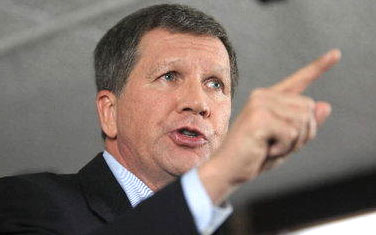
|
 |
Reaction: The Columbus Dispatch
Editorial: State of the state
Speech gave outline
of dramatic changes in store for Ohio
Wednesday, March 9, 2011
Photo: Cleveland Plain Dealer
In his State of the State address on Tuesday, Gov. John Kasich’s
message was plain-spoken, passionate and clear: Dramatic change is in
store for Ohio.
Not that this is a surprise.
He’s been saying as much for the past year, and in his first few weeks
in office, he already has begun moving - for example, his JobsOhio
plan, which is a radical restructuring of the state’s
economic-development program. The rewrite of Ohio’s
collective-bargaining law, a legislative effort that enjoys his
support, has been approved by the Ohio Senate and now is under
consideration in the House.
What Tuesday’s speech did was signal other areas in which Ohioans can
expect significant initiatives. Kasich painted in broad strokes,
leaving the details until Tuesday, when he unveils his proposed
biennial budget for 2012-2013.
The major elements include:
• Restructuring the way Ohio cares for the elderly, with much more
emphasis put on providing in-home care, which is cheaper and allows
seniors to remain in their homes, rather than being placed in nursing
homes. His stated intent to buck powerful special interests was a clear
reference to the nursing-home industry, which has enjoyed undue
influence in the legislature for decades.
• Reforming prison policy to reduce costs. He noted that 47 percent of
the people in Ohio’s prisons spend less than a year behind bars.
Processing large numbers of inmates is expensive, and a waste of money
when they spend such a short time in custody. And since these are
relatively low-level offenders, putting them elbow to elbow with
serious criminals is foolish. He also raised questions about laws that
make felons of people whose crimes don’t seem to rise to that level,
such as the Akron mother convicted for fraudulently putting her
children in a school district where she thought they would be safer.
• Improving efficiency in the management of Medicaid, and improving the
delivery of care. He noted that multiple state agencies now oversee
parts of the Medicaid program, and that improving delivery of care
could help reduce the incidence of low-birthweight babies.
• Education reforms focused on putting more money into classrooms and
less into administration. He emphasized finding ways for school
districts to share services, and vowed to make it easier for the
respected Teach For America program to bring highly motivated teachers
into Ohio’s classrooms.
• Giving local governments more flexibility to deal with the straitened
financial circumstances, including giving them more control of budgets
through collective-bargaining reform and by lifting unfunded mandates
from the state. He noted that for two years he has been warning
government bodies against using one-time federal stimulus money to add
or expand programs. Now that money is gone, he said, and he cannot fill
that “stimulus gap.”
The Republican governor made a point of thanking Senate Minority Leader
Capri S. Cafaro, D-Hubbard, for her help in rounding up Democratic
support for the Jobs-
Ohio bill. This was one of several efforts Kasich made to acknowledge,
request and underline the need for bipartisan cooperation to confront
the very serious issues facing Ohio. There is no escaping the need for
reconstituting state government, but that effort can be easier if the
parties undertake it together.
The governor’s speech presented the outlines of an ambitious to-do
list. Next week will unveil the detailed plan.
Read it at the Columbus Dispatch
|
|
|
|

